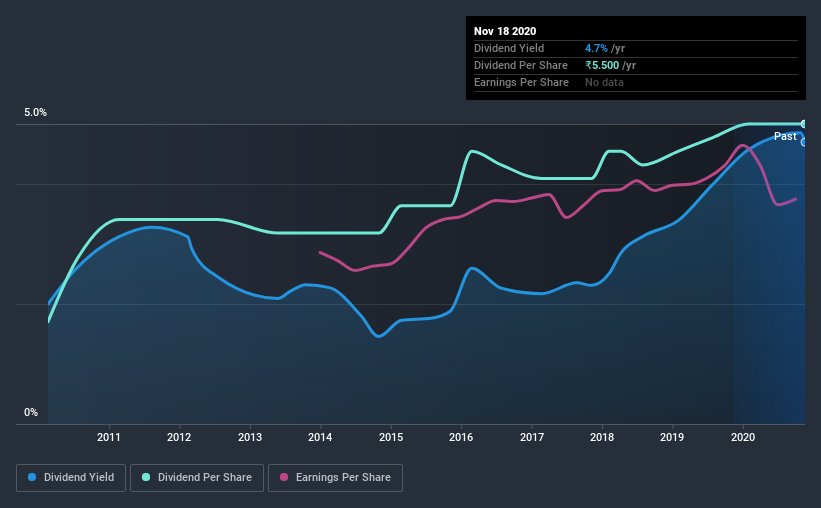Could Castrol India Limited (NSE:CASTROLIND) Have The Makings Of Another Dividend Aristocrat?

Dividend paying stocks like Castrol India Limited (NSE:CASTROLIND) tend to be popular with investors, and for good reason - some research suggests a significant amount of all stock market returns come from reinvested dividends. On the other hand, investors have been known to buy a stock because of its yield, and then lose money if the company's dividend doesn't live up to expectations.
In this case, Castrol India likely looks attractive to investors, given its 4.7% dividend yield and a payment history of over ten years. We'd guess that plenty of investors have purchased it for the income. Some simple research can reduce the risk of buying Castrol India for its dividend - read on to learn more.
Click the interactive chart for our full dividend analysis

Payout ratios
Dividends are typically paid from company earnings. If a company pays more in dividends than it earned, then the dividend might become unsustainable - hardly an ideal situation. Comparing dividend payments to a company's net profit after tax is a simple way of reality-checking whether a dividend is sustainable. Castrol India paid out 82% of its profit as dividends, over the trailing twelve month period. Paying out a majority of its earnings limits the amount that can be reinvested in the business. This may indicate a commitment to paying a dividend, or a dearth of investment opportunities.
In addition to comparing dividends against profits, we should inspect whether the company generated enough cash to pay its dividend. Castrol India paid out 69% of its cash flow as dividends last year, which is within a reasonable range for the average corporation. It's encouraging to see that the dividend is covered by both profit and cash flow. This generally suggests the dividend is sustainable, as long as earnings don't drop precipitously.
While the above analysis focuses on dividends relative to a company's earnings, we do note Castrol India's strong net cash position, which will let it pay larger dividends for a time, should it choose.
We update our data on Castrol India every 24 hours, so you can always get our latest analysis of its financial health, here.
Dividend Volatility
From the perspective of an income investor who wants to earn dividends for many years, there is not much point buying a stock if its dividend is regularly cut or is not reliable. For the purpose of this article, we only scrutinise the last decade of Castrol India's dividend payments. During this period the dividend has been stable, which could imply the business could have relatively consistent earnings power. During the past 10-year period, the first annual payment was ₹1.9 in 2010, compared to ₹5.5 last year. Dividends per share have grown at approximately 11% per year over this time.
It's rare to find a company that has grown its dividends rapidly over 10 years and not had any notable cuts, but Castrol India has done it, which we really like.
Dividend Growth Potential
Dividend payments have been consistent over the past few years, but we should always check if earnings per share (EPS) are growing, as this will help maintain the purchasing power of the dividend. Earnings have grown at around 7.1% a year for the past five years, which is better than seeing them shrink! Past earnings growth has been decent, but unless this is one of those rare businesses that can grow without additional capital investment or marketing spend, we'd generally expect the higher payout ratio to limit its future growth prospects.
Conclusion
To summarise, shareholders should always check that Castrol India's dividends are affordable, that its dividend payments are relatively stable, and that it has decent prospects for growing its earnings and dividend. Castrol India's is paying out more than half its income as dividends, but at least the dividend is covered by both reported earnings and cashflow. Earnings per share growth has been slow, but we respect a company that maintains a relatively stable dividend. While we're not hugely bearish on it, overall we think there are potentially better dividend stocks than Castrol India out there.
It's important to note that companies having a consistent dividend policy will generate greater investor confidence than those having an erratic one. Still, investors need to consider a host of other factors, apart from dividend payments, when analysing a company. Now, if you want to look closer, it would be worth checking out our free research on Castrol India management tenure, salary, and performance.
If you are a dividend investor, you might also want to look at our curated list of dividend stocks yielding above 3%.
When trading Castrol India or any other investment, use the platform considered by many to be the Professional's Gateway to the Worlds Market, Interactive Brokers. You get the lowest-cost* trading on stocks, options, futures, forex, bonds and funds worldwide from a single integrated account. Promoted
New: AI Stock Screener & Alerts
Our new AI Stock Screener scans the market every day to uncover opportunities.
• Dividend Powerhouses (3%+ Yield)
• Undervalued Small Caps with Insider Buying
• High growth Tech and AI Companies
Or build your own from over 50 metrics.
This article by Simply Wall St is general in nature. It does not constitute a recommendation to buy or sell any stock, and does not take account of your objectives, or your financial situation. We aim to bring you long-term focused analysis driven by fundamental data. Note that our analysis may not factor in the latest price-sensitive company announcements or qualitative material. Simply Wall St has no position in any stocks mentioned.
*Interactive Brokers Rated Lowest Cost Broker by StockBrokers.com Annual Online Review 2020
Have feedback on this article? Concerned about the content? Get in touch with us directly. Alternatively, email editorial-team@simplywallst.com.
About NSEI:CASTROLIND
Castrol India
Manufactures and markets automotive and industrial lubricants in India and internationally.
Outstanding track record 6 star dividend payer.


